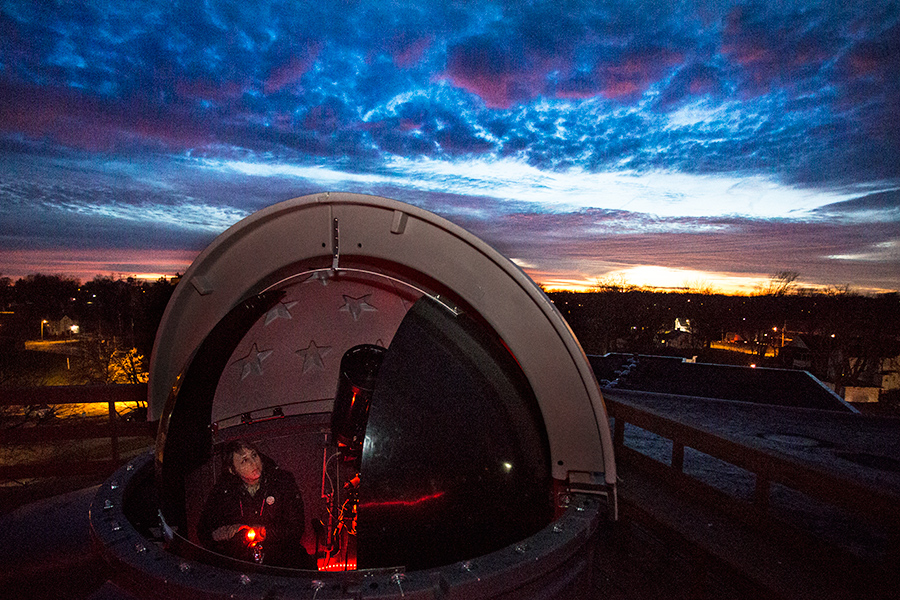Knox Stories
Knox Summer Scholars: A Summer of Research, Growth, and Community
Knox Summer Scholars gives students the chance to pursue in-depth projects with faculty mentors and motivated peers.
Venture Boldly

Office of Communications
2 East South Street
Galesburg, IL 61401


Knox students will now be able to minor in three scientific fields that are in high demand in the marketplace and of high interest to students. Health studies, statistics, and astronomy join the 40 majors and 47 minors currently available at Knox.
The minors were developed by Knox faculty to meet the increasing student interest in these fields of study, which also complement a number of current majors. Through research of peer institutions, faculty found that these minors aren't widely offered, but are growing in demand.
"All three new minors are terrific additions to our liberal arts education at Knox," said Laura Behling, vice president for academic affairs and dean of the College. "They're interdisciplinary, blend theory with practice, provide new ways of critically looking at the world around us, and engage and challenge Knox students in new, innovative fields."
The new minors were developed through the support of a $400,000 Andrew W. Mellon Foundation grant to explore new methods and technologies for classroom teaching and develop new interdisciplinary courses and collaborative programs for research and creative work outside of the classroom. "All three minors will provide students with important hands-on learning," said Behling. "Students who minor in human health, for example, will complete an internship in the community that allows them to consider social, political, and economic influences on health. Astronomy minors will spend time gazing through our telescope atop the Science and Mathematics Center, and maybe even travel with faculty to use more powerful telescopes. Statistics minors will work with real-world data."
Behling says that these minors, anchored with the sciences at Knox, demonstrate the creativity of Knox faculty. "They demonstrate the continual commitment our faculty have to educating our students in and for today's world."
The minor in health studies at Knox includes the scientific, biological, psychological, cultural, economic, spiritual, and ethical factors that impact the health of individuals and society as a whole. "It's unique in that it's not a medical approach, which is the traditional approach to thinking about health," said Andy Hertel, assistant professor of psychology. "It's a liberal approach in that it approaches health from multiple perspectives."
Because the minor will examine health in a variety of ways, the content will appeal to students from a broad range of disciplines, including the sciences, humanities, and social sciences. The minor will help prepare students for the growing fields of public health, community health, health advocacy, medicine, and related fields. The minor will also have broad appeal for students interested in politics, education, and business.
"Health is bigger than just medicine," said Hertel. "This program helps facilitate effectiveness and team interaction in a new model of health."
With the advent of widely available data, it's becoming increasingly invaluable to be able to turn that data into information, and that information into action. At Knox, the minor in statistics is a fitting companion to a number of majors where statistical analysis plays an essential role, including political science, economics, psychology, education studies, biology, and many other fields of inquiry.
"If you want to really understand the world, you need to understand it quantitatively and sensibly," said Kevin Hastings ‘76, Rothwell Stephens Distinguished Chair in Mathematics. "A student in one of these areas that also has extra statistical expertise is, I think, a real powerhouse, with increased employment opportunities and the ability to analyze the world."
This is a golden age for astronomy. Advances in telescope design, burgeoning databases of astronomical data to be analyzed, and the recent discovery of problems of fundamental importance-like the nature of dark matter and the accelerating expansion of the universe-have contributed to making this field one the the hottest in science.
A minor in astronomy, together with a major in the physical sciences or mathematics, is a strong preparation for students interested in a career in astronomy or astrophysics, in pursuing graduate studies, or for students with an interest in secondary education in the sciences.
"A physics major and astronomy minor at Knox would look very similar to an astronomy major at a larger school. The coursework would be nearly identical," said Nathalie Haurberg ‘06, assistant professor of physics. "You can become a good researcher at both. But at Knox, you'll also learn to write well and think critically, which will help you become the researcher you really should be."
Other minors are currently being developed and will be announced in coming months.
Pictured above: Assistant Professor of Physics Nathalie Haurberg '06 in the observation dome atop the Umbeck Science-Mathematics Center.
Published on March 11, 2016